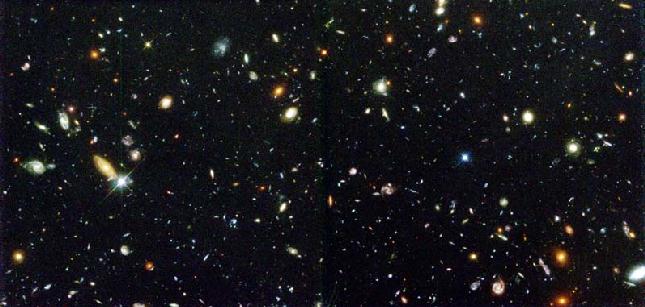Explanation: Galaxies like colorful pieces of candy fill the Hubble Deep Field - humanity's most distant yet optical view of the Universe. The dimmest, some as faint as 30th magnitude (about four billion times fainter than stars visible to the unaided eye), are the most distant galaxies and represent what the Universe looked like in the extreme past, perhaps less than one billion years after the Big Bang. To make the Deep Field image, astronomers selected an uncluttered area of the sky in the constellation Ursa Major (the Big Bear) and pointed the Hubble Space Telescope at a single spot for 10 days accumulating and combining many separate exposures. With each additional exposure, fainter objects were revealed. The final result can be used to explore the mysteries of galaxy evolution and the infant Universe.
Tomorrow's picture: A Mars Glint
1999 2000 2001 2002 2003 2004 2005 2006 2007 2008 2009 2010 2011 2012 2013 2014 2015 2016 2017 2018 2019 2020 2021 2022 2023 2024 2025 2026 |
Yanvar' Fevral' Mart Aprel' Mai Iyun' Iyul' Avgust Sentyabr' Oktyabr' Noyabr' Dekabr' |
NASA Web Site Statements, Warnings, and Disclaimers
NASA Official: Jay Norris. Specific rights apply.
A service of: LHEA at NASA / GSFC
& Michigan Tech. U.
|
Publikacii s klyuchevymi slovami:
cosmology - universe - Hubble Deep Field - Bol'shoi Vzryv - dalekie galaktiki - evolyuciya galaktik - Habblovskie oblasti glubokogo obzora
Publikacii so slovami: cosmology - universe - Hubble Deep Field - Bol'shoi Vzryv - dalekie galaktiki - evolyuciya galaktik - Habblovskie oblasti glubokogo obzora | |
Sm. takzhe:
Vse publikacii na tu zhe temu >> | |
